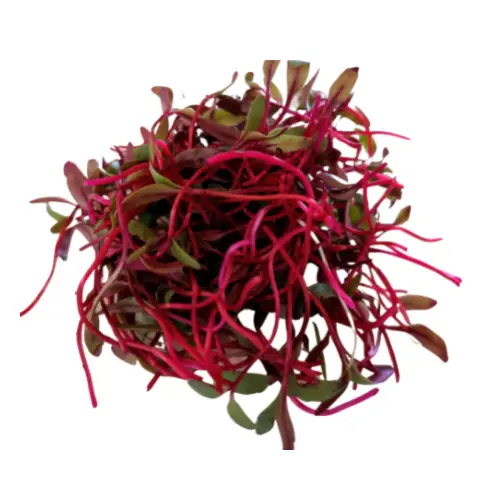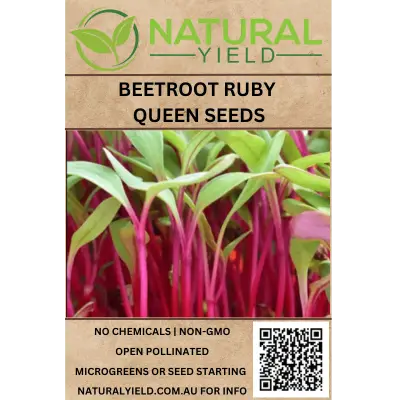Beetroot Microgreen Nutrition Fact Sheet

What is Beetroot Microgreen?
Beetroot microgreens are young, tender vegetables that are typically harvested within 10 to 14 days after planting. These tiny, vibrant plants can be grown both indoors and outdoors, making them a versatile addition to any garden. Packed with an abundance of vitamins, minerals, and antioxidants, beetroot microgreens offer numerous health benefits that can contribute to a balanced diet.
The beet plant has a rich history in cooking, having been utilized in various culinary traditions for centuries, not only for the unique flavor and lively color it brings to dishes but also for its delightful texture that enhances a wide range of recipes. Whether added to salads, smoothies, or as garnishes, beetroot microgreens are a nutritional powerhouse that can elevate your meals.
Nutrition Profile
In addition to adding flavor and color to foods, beet microgreens are a rich source of antioxidants. Incorporating this young variety of vegetables into your diet can be a simple way to get the nutritional benefits you need without investing a lot of time in preparing elaborate meals.
Beetroot microgreens are a popular choice among people looking for natural options to supplement their dietary regimen, as they are a powerful source of a wide range of nutrients.
Beetroot microgreens provide 22 calories per 100 grams, 2.2 grams of protein, 4.3 grams of carbohydrates, of which 3.7 grams are excellent quality fiber. Among the main vitamins provided by beet microgreens are vitamin K (333% of the DV), vitamin A (35% of the DV), vitamin C (33% of the DV), vitamin E (10% of the DV). The main minerals provided by these microgreens are copper (21% of the DV), magnesium (17% of the DV), manganese (17% of the DV), potassium (16% of the DV), iron (14% of the DV) and calcium (9% of the DV).
This outstanding nutritional contribution is maintained if these microgreens are used raw. It is recommended that cooking be done by dry heat, as in sautéing, to keep this nutrient contribution intact.
Health Benefits
Beet microgreens provide several health benefits due to their nutritional composition:
Improve bone health and prevent bleeding: beet microgreens are rich in vitamin K, which combines with protein and calcium to build strong bones. In addition, eating foods rich in this vitamin helps maintain healthy blood clotting, preventing bleeding.
Helps maintain skin and eye health: Beet microgreens contain a large amount of vitamin A, which is essential for healthy skin and good vision. It also helps convert food into energy and keeps the immune system active. Vitamin A is essential for healthy bone development.
Improve immunity: The vitamin C present in beet microgreens strength the immune system and may reduce the risk of developing some autoimmune diseases. This vitamin is needed to produce collagen, which is essential for wound healing and maintaining healthy blood vessels.
Prevent cardiovascular disease: Beet microgreens are rich in potassium, which is essential for regulating blood pressure and heart rate. Consuming enough potassium can decrease the risk of developing high blood pressure.
Prevent anemia and chronic fatigue: Beet microgreens contain more iron than spinach, which is vital for transporting oxygen through the body via a protein called hemoglobin. Those with iron deficiency can develop anemia, so it is important to include iron-rich foods such as iron microgreens. In this case, it is recommended to include a portion of food with vitamin C in the same meal to increase absorption.
Maintain gastrointestinal tract health: Beet microgreens are high in soluble and insoluble fiber, which helps maintain healthy digestion and promotes beneficial intestinal bacteria.
They are potent anti-inflammatories: Betalains are phytonutrients in beet microgreens and powerful antioxidants that protect cells against oxidative damage. They also contain detoxifying and anti-inflammatory properties.
Finally, beet microgreens are a natural source of nitrites, which can help lower blood pressure and improve circulation by dilating arteries and veins. This vegetable also contains nitrates that increase oxygen flow through the body and keep cardiovascular health in good condition.
Adding beet microgreens can be very beneficial, especially for people who cannot consume large amounts of fiber or leafy green vegetables.
References
Acharya, J., Gautam, S., Neupane, P., & Niroula, A. (2021). Pigments, ascorbic acid, and total polyphenols content and antioxidant capacities of beet (Beta vulgaris) microgreens during growth. International Journal of Food Properties, 24(1), 1175–1186. https://doi.org/10.1080/10942912.2021.1955924
Rocchetti, G., Tomas, M., Zhang, L., Zengin, G., Lucini, L., & Capanoglu, E. (2020). Red beet (Beta vulgaris) and amaranth (Amaranthus sp.) microgreens: Effect of storage and in vitro gastrointestinal digestion on the untargeted metabolomic profile. Food Chemistry, 332(127415), 127415. https://doi.org/10.1016/j.foodchem.2020.127415
Wojdyło, A., Nowicka, P., Tkacz, K., & Turkiewicz, I. P. (2020). Sprouts vs. Microgreens as novel functional foods: Variation of nutritional and phytochemical profiles and their in vitro bioactive properties. Molecules (Basel, Switzerland), 25(20), 4648. https://doi.org/10.3390/molecules25204648
Zhang, Y., Xiao, Z., Ager, E., Kong, L., & Tan, L. (2021). Nutritional quality and health benefits of microgreens, a crop of modern agriculture. Journal of Future Foods, 1(1), 58–66. https://doi.org/10.1016/j.jfutfo.2021.07.001
(N.d.). Researchgate.net. Retrieved April 27, 2023, from https://www.researchgate.net/publication/364609144_MICROGREENS_A_NUTRITIOUS_FOOD_FOR_21_CENTURY
Disclaimer: The information provided in this article is for educational and informational purposes only and is not intended as medical advice. It is not a substitute for professional medical advice, diagnosis, or treatment. Always seek the advice of a qualified healthcare provider with any questions you may have regarding a medical condition. The author and publisher of this article are not responsible for any adverse effects or consequences resulting from the use of any suggestions, preparations, or procedures described in this article.


